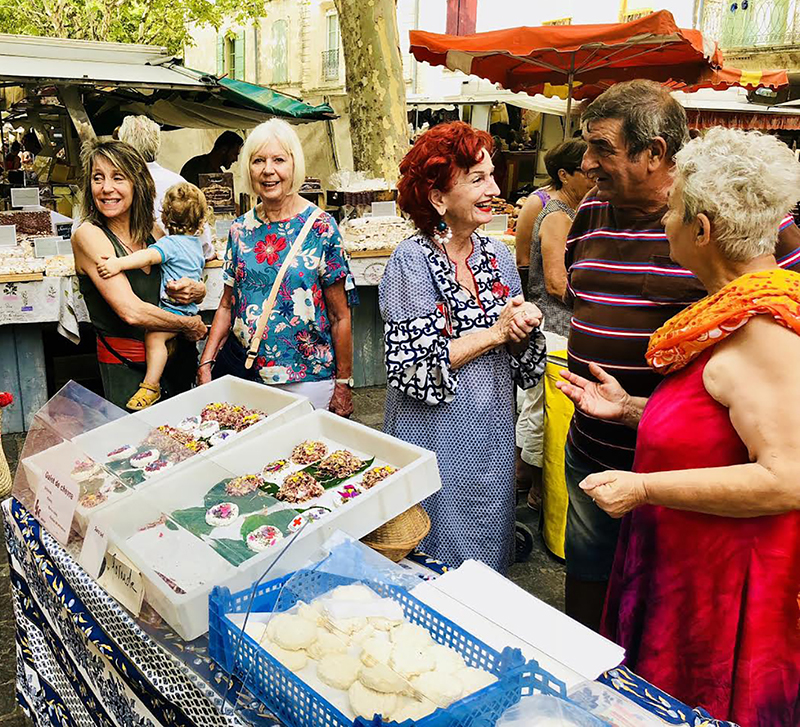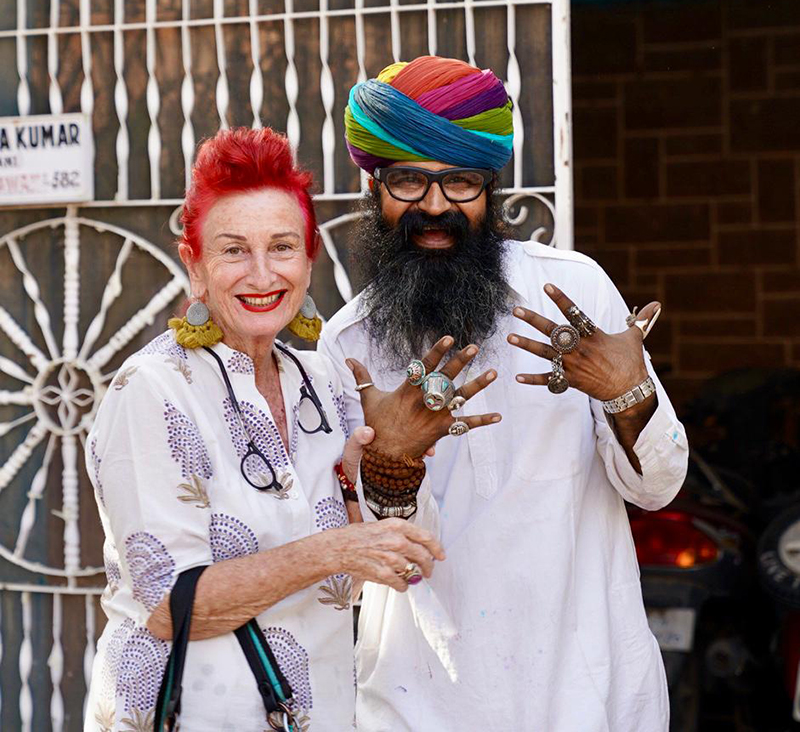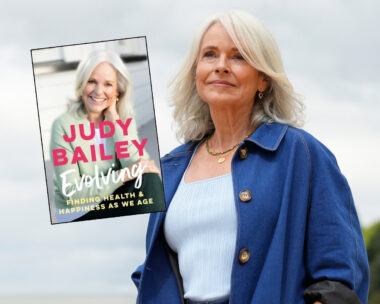Sitting in the lounge of Peta Mathias’ Auckland home is somehow both peaceful and invigorating.
Despite it being a rented property – she sold her house in Ponsonby to help fund the one she built in France – it looks exactly as you would imagine a Peta Mathias home to look. Colour, colour, everywhere, as far as the eye can see.
There’s a pink patterned couch, a squashy turquoise floral armchair, art on the walls, and beloved knick-knacks from her many years of many travels line the tops of bookcases.
Displaying her chosen outfits from her wardrobe for her Australian Women’s Weekly cover shoot, there is an embarrassment of riches to pick from.
Peta knows fashion just as well as she knows food. She has an entire shed full of designer clothes she’s collected over the years, but she’s been back in the country for less than 24 hours on the day of the shoot so the clothes she has to pick from are all from her latest trip to India.
This is not a hardship: there are gossamer-light silk dresses featuring intricate hand-crafted details, and a collection of jewellery that manages to be both beautiful and totally bonkers. It’s a good life, you have to think, being Peta Mathias.

Peta in India where she runs three different culinary adventures .
It is also an entirely different life from the one she thought she would have.
Peta has written, she guesses, about 14 books over the years and she also maintains a blog on her website, where she writes about the three best topics there are to write about: travel, food, love.
A quote from the American mythologist and writer Joseph Campbell pops up in her work every so often, and it’s a goody: “We must be willing to get rid of the life we’ve planned, so as to have the life that is waiting for us.”
It’s a saying that Peta has loved for years, because it is something she lives by.
“I have not had the life I planned at all. If you had told me when I was 17, ‘This is what you’re going to do and this is what you’re going to become,’ I just would have laughed. Because none of what I’ve done was in the plan. I was going to be a nurse, and then I was going to get married and have a family, and live a slightly left of centre, but conventional, life.”
She laughs to herself.
“I had no inkling whatsoever that none of that was going to happen.”

On life at 70
This year, Peta is turning 70.
“Yikes,” she says, when this is brought up, even though you have to admit she is a sensational advert for growing older.
Two years ago, her mother died at the age of 96. Her father also died in his 90s. It appears she might have good genes.
“I’m afraid so,” she says drily. “I don’t really want to live to 96 but I have a terrible feeling I’m going to.”
When she turned 60, she threw a massive party in Marrakesh and then an even bigger party at the Auckland museum, to raise money for multiple sclerosis. All her performer friends came and put on a show: drag queens from K Road, Bollywood dancers, opera singers.
“And I’m going to do it all again this year! I mean, if you’re going to be that old, you might as well have a party.”
Because of who she is and what she does, Peta gets asked a lot about the secret to happiness.
Her answer is deceptively simple: “Happiness is really being on the right path and leading the life that you’re meant to be living.”
And it’s hard not to look at Peta’s life and have a pang or two of envy – or a huge hit of it – if you’re also someone who would love to spend your time living half the year in New Zealand, half the year in France, and hosting international culinary tours. As far as day jobs go, you couldn’t design a better one.
But, as Peta says, it comes with its share of sacrifices.
“You have to exchange, in life. You have to think, ‘Okay, so if I want to do all these things, then I can’t have a husband and a family. I can’t do both.’ I knew really early on that I had to make a choice.
“Some women don’t have to make a choice, some women do it all,” she says. “I got married to people, I got unmarried to people. I had relationships, I un-had relationships. But basically, I was on my own really.”
It’s her “big, strong Catholic family” that gave her the core of belonging.
“I didn’t choose, particularly, this life – your life just happens to you. But, you know, hosting culinary tours and writing books – it’s such a fantastic job, how could you say no to it?”

Peta at the market in Uzès, the medieval French town she lives in for part of each year.
But there is a cost, she says, and it’s not what you think it might be; for instance, the lack of routine that comes from a nomadic lifestyle isn’t the problem.
“My stability doesn’t come from without, it comes from within. That is how I am able to live this life.”
It is, however, emotionally intense, she says, leading tours around the world and teaching cooking when she’s based in her French home in Uzès.
Peta is not – she says with a sly wink – “a relaxed person” so there are times when she gets uptight and tired and overwhelmed.
“But the good side is so good that I control the bad side with yoga, and rest, and being quiet, mostly. Every so often I get down in the dumps, which I think most of us do, and it’s nothing to be ashamed of. I think a lot of people wake up at five in the morning and just feel totally black; that happens to me. I just wait – and as soon my feet go on the floor, it lifts and I see the point of life again.”
The crucial part, Peta believes, is to not fear these black moments.
“It’s part of life, everything doesn’t always have to be wonderful and positive and feeling happy. We put a lot of pressure on ourselves: we have to be happy, we have to be fulfilled.”
The need to question who we are and what we’re doing with our life is something almost all of us dip into from time to time.
“I kind of skated along for a while. I was a very late bloomer – I didn’t start doing anything with my life until I was about 30. Because of this, I treasure every moment and feel this great pressure not to waste time. I think my PA, Rosie, would say, ‘Yeah, you could do okay to put the brakes on occasionally, honey.'”

There’s a fearlessness to Peta which is pretty intoxicating to be around. She may have been a late bloomer, but she was never a wallflower.
“I was always fearless,” she says, “because I had a very dramatic mother. We were vying for control of the world from day one.”
While writing one of her books, Peta wrote a chapter on getting a tattoo, and how it felt to have a story engraved into your body. So she got one: a rose, and the words “La vie en rose”, on her back shoulder.
“My friends were like, ‘Oooh, wait till we tell your mother!’ and I said, ‘Hello! I’m 60.’ And they said, ‘Yeah, but we know your mother.'”
When Peta did finally ring her mum Ann in Australia, she replied, “I have something to tell you, dear.”
It turns out that when Ann was 17 and had entered the Australian Navy, she’d had a small, blue beauty spot tattooed onto her face.
“Not even my father knew it was a tattoo,” Peta laughs.
She pulls a photo of her mother off the shelf; it’s black and white and shows, even as a teenager, the face of a woman you can absolutely imagine would get a tattoo and then be able to keep it a secret for 80-odd years.
Not only does the Mathias family have good genes, they obviously have strong character as well.
Her first book
In Peta’s author bio, it reads that she’s the writer of a number of books about “men, women and transformation”.
When she wrote her first book, Fête Accomplie, back in 1995, it was rejected by a number of publishers until it found its way to Random House, who could see its potential.
It was supposed to be a recipe book, but the paragraphs in between were more interesting than the recipes themselves; they told the story of how she had gone from being a nurse in New Zealand to following her dream of opening her own restaurant in Paris.
Random House – who still publish her books today – told her to cut out half the recipes and “write three times as much about your life in Paris because that’s what we think is going to sell the book”. So she did, and it changed her life.
“Maybe I would never have discovered that. It’s great to have the freedom to be able to try new things,” she says. “You know – it ain’t ever over until the fat lady sings.”

Peta cites someone like Jane Fonda as an example of ageing well, although she says she relates more to Frankie in Jane’s Netflix show Grace and Frankie (“Doesn’t everyone?”).
“She has a good sense of humour, and a great insight into herself and what it’s really like to be an older woman and still be working and contributing,” Peta says of the now 81-year-old actress.
As well as taking more culinary tours, Peta is also writing another book – “I don’t have time to write it, and I’m going to miss my deadline, and I’m going to go to hell, because I’m a Catholic” – about a topic close to her heart. It’s a series of love stories, originally pitched to her as something sweet and “lovey-dovey”.
“Because of the way I am, my love stories are a lot more sharp and dramatic. They could be puppets. They could be birds. It could be Greek mythology, it could be Maori mythology. But it has to be unusual.”
She’s at a point in both her life and career where she can pick the projects that interest her.
“If you want to be successful, you have to know what motivates you. Money doesn’t motivate me: excitement, adventure and romance motivate me.”
She’s not afraid of stepping into the unknown, something she advises more women to consider, particularly as New Year not only offers time to reflect, but also to plan ahead.
“If you’re holding onto things for security, then you’re never going to make the change,” she says. “You just have to do it; you just have to burn the bridge. For most people, that’s really scary. But once you’ve burnt the bridge, you think, ‘Oh, well, that was a bit uncomfortable but I’m okay.’ It doesn’t have to be massive: you could change your job, or redecorate your house. Or write, if you’ve always wanted to write. It just has to be true to the core of what you know is right, and what you would like to do. Because we all want to feel that we’re doing something meaningful, that we’re not just breathing in and out.”
Peta is leading six culinary tours around India, Morocco, Italy, Vietnam, Spain and France in 2019. For details, go to petamathias.com.



